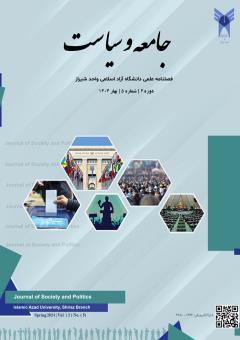Examining the role of the Rouhani government's performance on Iran's political stability
Subject Areas : political sociology
Azam Abazari
1
![]() ,
jalal mirzaei
2
,
jalal mirzaei
2
![]() ,
hosein moeinabadi bidgoli
3
*
,
hosein moeinabadi bidgoli
3
*
![]()
1 - Political Science, Faculty of Law and Theology, Shahid Bahonar University of Kerman, Kerman
2 - Political Science, Faculty of Law and Theology, Shahid Bahonar University of Kerman, Kerman
3 - Political Science, Faculty of Law and Theology, Shahid Bahonar University of Kerman, Kerman
Keywords: Political stability, political instability, Rouhani's government, comparative-qualitative method, eightyear performance,
Abstract :
Political stability refers to the relative absence of certain "destabilizing" political events that manifest as changes in the structure of power and changes in government through peaceful or violent actions. Therefore, the research problem of this study is to examine the status of political stability and instability during Hassan Rouhani's presidency (2013-2021) and to investigate the most important factors influencing it. By doing so, this study aims to provide a model (conceptual framework) for analyzing it. The present study, entitled "Examining the Role of Rouhani's Government Performance on Political Stability in Iran," seeks to analyze and interpret the impact of Rouhani's government performance on political stability over two four-year periods. In this study, four components encompassing political stability are examined independently and separately as factors: political participation, changes in government, the relationship between the governing institution and institutions affiliated with the government, and the functions of the government. Emphasis on these factors is based on political evidence and realities in Iran, as well as the opinions and studies of Saunders, David Easton, Huntington's theory, and Parsons. To achieve the objectives of this study, the researcher employed a qualitative comparative method and utilized both domestic and foreign sources as data collection tools. The findings of this study indicate that the solution to strengthening political stability and durability in Rouhani's first term lies in political balance and theoretical consensus among power institutions, political participation, and government functions in economic areas such as controlling and reducing inflation rates, strengthening people's purchasing power, and increasing economic growth. In the second term, the decline of these indicators is considered a factor of instability. However, the inability to align policies and orientations with the leadership's approach in foreign policy has had a greater impact on the instability of Rouhani's government in the second term.
1. ایسنا خبرگزارى دانشجویان ایران.1392 حمایت رسمى هاشمى از روحانى 21 خرداد. قابل دسترس در:https:// www. isna. ir/ news/ 92032112556/ [1396
2. باشگاه خبرنگاران جوان، (03، 11، 1396)
3. بیدقی، لیلا. (1399). نقش توسعه سیاسی در ثبات سیاسی: مطالعه موردی استان سمنان، پایاننامه، دانشگاه آزاد اسلامی واحد شاهرود، دانشکده علوم انسانی، گروه علوم سیاسی.
4. پایگاه خبرگزاری جماران، (31/5/1394). Retrieved from https://www.mashreghnews.ir/news/886927
5. پایگاه خبرگزاری فارس، (29/10/1394).
6. خبرگزارى صداوسیما (1394). «سخنرانى روحانى در همایش اجراى برجام». 29 دى. قابل دسترس IRIBNEWS.IR..www.
7. خواجه سروي، غلامرضا (1382). رقابت سیاسي و ثبات سیاسي در جمهوری اسلامي ایران، تهران: مرکز اسناد انقلاب اسلامی.
8. دلاوری، ابوالفضل و رهبری، محمد.(1402)، وعدههای انتخاباتی، محدودیتهای دولت و اعتراضات سیاسی در ایران؛ مطالعه موردی نخستین سال دولت دوم روحانی (مرداد 2396 تا مرداد 1397)، دولتپژوهی،9(34)، 214-179 https://doi.org/10.22054/tssq.2023.54080.978
9. ذوالفقاری، ابراهیم (1399). مقایسه تطبیقی عملکرد دولت روحانی و دولت احمدینژاد در مواجهه با تحریمها، پایاننامه، دانشگاه پیام نور مرکز رشت.
10. ساموئل،هانتینگتون. (1370). سامان سیاسی در جوامع دستخوش دگرگونی. ترجمه محسن ثالثی، تهران، نشر علم.
11. ساندرز، دیوید (1390)، الگوهای بیثباتی سیاسی، ترجمهی پژوهشکده مطالعات راهبردی، تهران: پژوهشکده مطالعات راهبردی.
12. سعیدی، علیرضا. (1400). چارچوبی برای تحلیل رقابت و ثبات سیاسی با نگاهی به تجربه جمهوری اسلامی ایران، مطالعات علوم سیاسی، حقوق و فقه، 7(1)، 528-517.
13. شاهآبادی، ابوالفضل، بهاري، زهرا. (1393). تأثیر ثبات سیاسی و آزادي اقتصادي بر رشد اقتصادی کشورهاي منتخب توسعه یافته و در حال توسعه، صص 72-53
14. صادقی جقه، سعید (1400). تحلیل؛ انتخابات خرداد 1400؛ ضرورت تداوم ثبات سیاسی و مدیریتی، نشریه دیده بان امنیت ملی، شماره 110، صص33-38.
15. صارمی، محمدرضا، رضایی، علیرضا، ترابی، قاسم (1400)، پیامدهای سیاست خارجی دولت روحانی بر تعاملات بینالمللی جمهوری اسلامی ایران، فصلنامه علمی مطالعات روابط بینالملل، سال چهاردهم، شماره 53، بهار 1400، صص 34-9.
16. صفریان، روحالله، شهرام نیا، امیر مسعود، امام جمعه زاده، سیدجواد، مسعود نیا، حسین (1398)، الگوی حکمرانی خوب و توسعه اقتصادي د ر ایران و ترکیه 2006 تا 2017، فصلنامه رهیافتهاي سیاسی و بینالمللی، دوره 11، شماره دوم، زمستان.
17. عبدالهی، مجید؛ قائدی، محمدرضا؛ مرادی، مریم؛ ابوالحسن شیرازی، حبیب¬اله. (1402). تحلیلی بر برنامه جهانی هفدهگانه توسعه و رویکرد سیاست خارجی جمهوری اسلامی ایران. فصلنامه جامعه و سیاست، سال 1، شماره 3، شیراز، صص 1-16.
18. فوزی، یحیی (1384). تحولات سیاسی اجتماعی بعد از انقلاب اسلامی در ایران، چاپ و نشر عروج، 1384.
19. گروه مطالعاتی امنیت (1387)، تهدیدات قدرت ملی شاخصها و ابعاد، چاپ اول، تهران: دانشگاه عالی دفاع ملی.
20. محمدیلرد، عبدالمحمود (1392)، انتخابات ریاست جمهوری یازدهم و ثبات سیاسی جمهوری اسلامی ایران، فصلنامه مطالعات راهبردی، سال هفدهم، شماره اول، بهار 1393.
21. مهربان اینچه برون، حامد؛ اکبری، سمیرا، احمدیان، قدرت (1401). تأثیر جهانی شدن بر ثبات سیاسی در دوران اصلاحات، اصولگرایی و اعتدالگرایی، نشریه دانش سیاسی، شماره 35، صص 249-278.
22. نوریان، احسان؛ گلپایگانی، حسن؛ بهشتی نیا، ادریس. (1402). رویکردهای جمهوری اسلامی ایران به مشارکت سیاسی به عنوان زیربنای مشروعیت سیاسی با تأکید بر نقش احزاب. فصلنامه جامعه و سیاست، سال 1، شماره 4، شیراز، صص 19-38.

